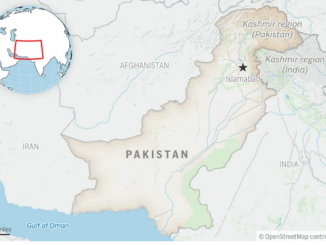
Ambassador Yojna Patel exercises India’s Right of Reply at the UN.
| Published April 29, 2025
India has sharply criticized Pakistan at the United Nations following the deadly Pahalgam terror attack on April 22, 2025, which resulted in 26 fatalities, primarily among Hindu tourists in Jammu and Kashmir. The assault, attributed to The Resistance Front (TRF), an offshoot of the Pakistan-based Lashkar-e-Taiba, has intensified diplomatic tensions between the two nations.
During a UN event on April 28, India’s Deputy Permanent Representative, Ambassador Yojna Patel, condemned the attack as a “criminal and unjustifiable act of terror.” She highlighted a recent interview with Pakistan’s Defence Minister Khawaja Asif, in which he admitted to Pakistan’s history of supporting, training, and funding terrorist organizations. Patel described this confession as exposing Pakistan as a “rogue state” fueling global terrorism and destabilizing the region. She also criticized Pakistan for misusing the UN platform to propagate baseless allegations against India .
In response, Pakistan has denied any involvement in the attack. Minister Asif suggested the possibility of the incident being a false flag operation by India and dismissed the TRF as no longer existing . This denial has been met with skepticism by India, which points to evidence linking the attack to Pakistan-based operatives.
The United Nations Security Council has condemned the Pahalgam attack in the strongest terms, urging that those responsible be held accountable and calling for international cooperation to address cross-border terrorism .
The incident has led to heightened border tensions, with reports of ceasefire violations along the Line of Control and retaliatory actions by Indian forces. India has suspended the Indus Waters Treaty, expelled Pakistani diplomats, and closed borders, while Pakistan has suspended the Simla Agreement and restricted trade .
As the situation develops, both nations continue to engage in diplomatic and military posturing, with the international community urging restraint and dialogue to prevent further escalation.
Here’s a breakdown of the pros and cons of the ongoing situation between India and Pakistan following the Pahalgam terror attack:
Pros for India:
-
International Support:
-
India has garnered international backing, particularly from the United Nations, which condemned the attack and urged for accountability.
-
The UN Security Council’s stance against terrorism strengthens India’s diplomatic position globally.
-
-
Exposure of Pakistan’s Terror Links:
-
By highlighting Pakistan’s support for terrorism, India has placed further scrutiny on Pakistan’s actions, potentially increasing international pressure on Pakistan to curb its support for terror groups.
-
India’s pointing to Khawaja Asif’s statement makes a clear case against Pakistan in the eyes of the world.
-
-
National Unity:
-
The attack may strengthen national resolve within India, uniting people against perceived external threats.
-
It rallies public sentiment against terrorism, particularly given the civilian victims in Jammu and Kashmir.
-
-
Stronger Security Measures:
-
India’s increased focus on border security and counterterrorism measures could lead to enhanced protection for its citizens and more robust defense capabilities in the region.
-
Cons for India:
-
Escalation of Tensions:
-
The suspension of agreements like the Indus Waters Treaty and the Simla Agreement could lead to further escalation in diplomatic and military tensions, making future negotiations harder.
-
The ceasefire violations and retaliatory actions increase the risk of military conflict.
-
-
Economic Strain:
-
The breakdown in trade relations and restrictions on cross-border commerce can harm both countries’ economies, especially in sectors reliant on trade.
-
-
Domestic Divisions:
-
While unity might be temporarily strengthened, the ongoing tension could exacerbate domestic political divisions and unrest, especially if there are concerns over the treatment of Kashmiri Muslims or other minority groups.
-
-
International Isolation:
-
While India’s stance is gaining international backing, prolonged conflict risks alienating neutral parties or causing global fatigue over South Asian tensions.
-
Pros for Pakistan:
-
International Sympathy:
-
Pakistan has denied involvement and could garner support from nations that view the situation through a different lens, questioning India’s accusations and portraying it as a victim of a false flag operation.
-
-
Internal Unity:
-
The tension with India could rally nationalistic sentiment within Pakistan, uniting the public against a common adversary and boosting political leverage for the government.
-
-
Stirring Doubts in International Media:
-
Pakistan’s narrative of India staging the attack as a false flag could attract some international skepticism about India’s narrative, especially in the media.
-
Cons for Pakistan:
-
Loss of Credibility:
-
Pakistan’s defense minister’s statement admitting to the historical support of terrorism weakens its international credibility, especially in the face of evidence linking attacks to Pakistan-based operatives.
-
-
Increased Isolation:
-
Pakistan’s denial and subsequent accusations against India could result in a lack of trust from both the international community and neighboring countries. This could also worsen its relationship with countries like the U.S. and China.
-
-
Rising Domestic Pressure:
-
Domestic and international pressure to address terrorism could increase, with Pakistan facing greater scrutiny regarding its role in regional instability.
-
-
Economic Fallout:
-
Similar to India, Pakistan’s economic ties with India, especially on water resources, energy, and trade, could face significant disruption, harming its own economy.
-
Shared Risks for Both Countries:
-
Risk of Full-Scale Conflict:
-
If tensions continue to rise, there is an increasing risk of full-scale war between the two nuclear-armed nations, which could destabilize the entire South Asian region.
-
-
Humanitarian Impact:
-
Both countries could face increased civilian casualties and displacement, especially in regions like Jammu and Kashmir, which already experience heightened military presence and conflict.
-
-
Global Security Concerns:
-
The intensifying conflict poses a broader security risk, with international powers worried about the possibility of nuclear escalation.
-
The situation remains highly delicate, with significant risk
Conclusion:
The Pahalgam terror attack has dramatically intensified the already strained relationship between India and Pakistan, with both nations engaged in a diplomatic and military standoff. India’s condemnation of Pakistan’s role in supporting terrorism, bolstered by the UN’s backing, has strengthened its position internationally. However, the heightened border tensions and retaliatory measures risk escalating the situation into broader conflict, with significant economic and humanitarian costs for both countries.
Pakistan, on the other hand, faces increasing international scrutiny, particularly with the admission by its Defense Minister of past involvement in supporting terrorist groups. While its denial of involvement in the Pahalgam attack may garner some domestic support, it risks further isolating itself internationally, particularly with growing evidence linking the attack to Pakistan-based operatives.
For both nations, the potential for conflict remains a grave concern, especially given their nuclear capabilities. While diplomatic avenues and international pressure could help in de-escalating tensions, the situation remains precarious. Both countries must tread carefully, balancing national security with international relations to avoid a catastrophic escalation. The international community’s call for restraint and dialogue will be crucial in determining the future stability of the region.
SOURCES: NDTV WORLD – “Confession Surprises No One”: India Shreds Pakistan At UN Over Pahalgam Attack
INDIA TODAY – Your Minister admitted to…: India shreds ‘rogue state’ Pakistan at UN





Be the first to comment